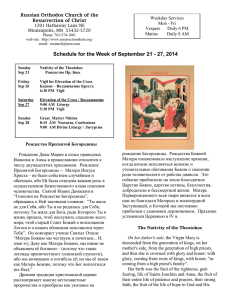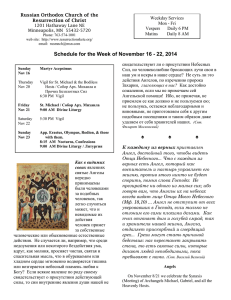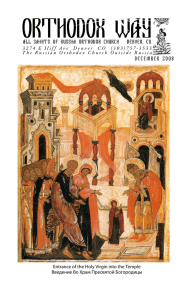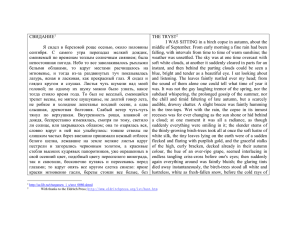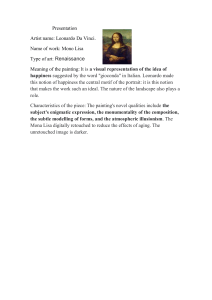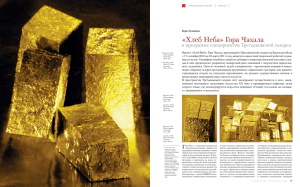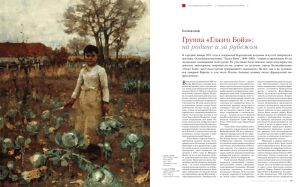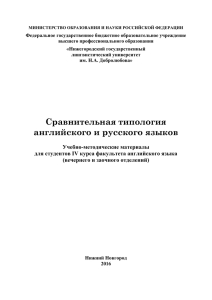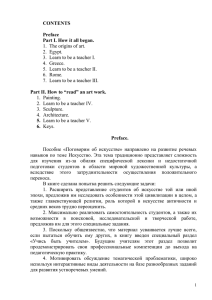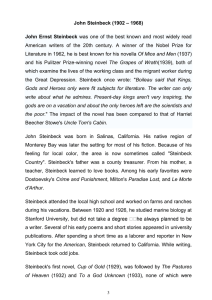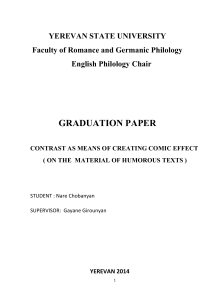Мотив судьбы в романе А.Мердок "Сон Бруно"
advertisement
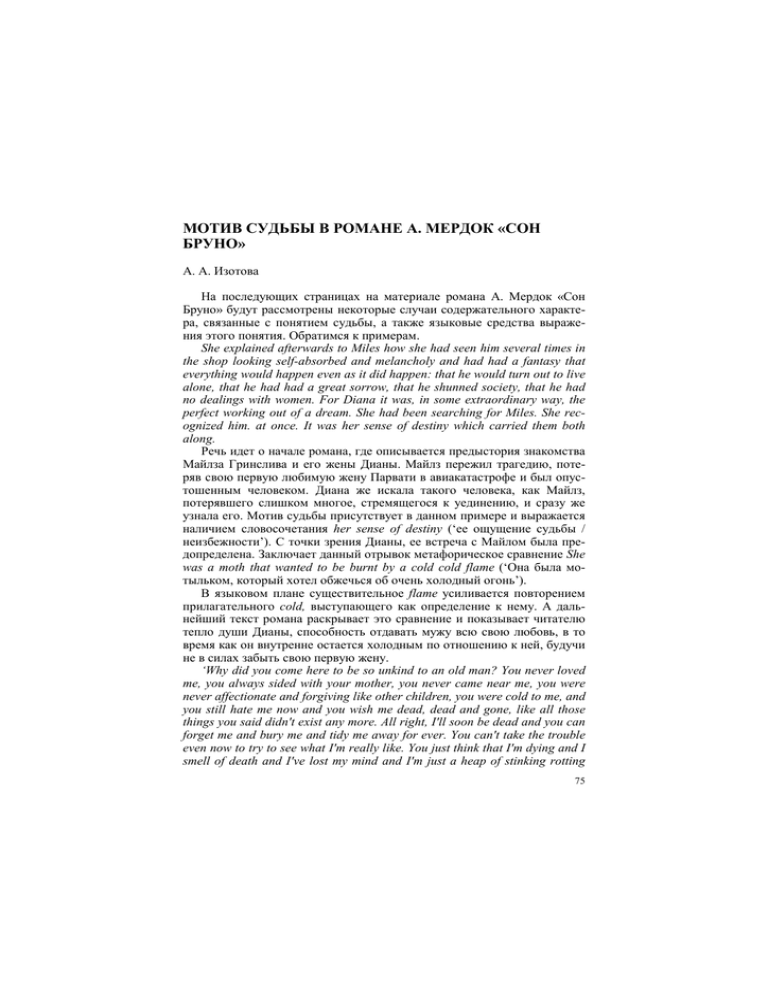
МОТИВ СУДЬБЫ В РОМАНЕ А. МЕРДОК «СОН БРУНО» А. А. Изотова На последующих страницах на материале романа А. Мердок «Сон Бруно» будут рассмотрены некоторые случаи содержательного характера, связанные с понятием судьбы, а также языковые средства выражения этого понятия. Обратимся к примерам. She explained afterwards to Miles how she had seen him several times in the shop looking self-absorbed and melancholy and had had a fantasy that everything would happen even as it did happen: that he would turn out to live alone, that he had had a great sorrow, that he shunned society, that he had no dealings with women. For Diana it was, in some extraordinary way, the perfect working out of a dream. She had been searching for Miles. She recognized him. at once. It was her sense of destiny which carried them both along. Речь идет о начале романа, где описывается предыстория знакомства Майлза Гринслива и его жены Дианы. Майлз пережил трагедию, потеряв свою первую любимую жену Парвати в авиакатастрофе и был опустошенным человеком. Диана же искала такого человека, как Майлз, потерявшего слишком многое, стремящегося к уединению, и сразу же узнала его. Мотив судьбы присутствует в данном примере и выражается наличием словосочетания her sense of destiny (‘ее ощущение судьбы / неизбежности’). С точки зрения Дианы, ее встреча с Майлом была предопределена. Заключает данный отрывок метафорическое сравнение She was a moth that wanted to be burnt by a cold cold flame (‘Она была мотыльком, который хотел обжечься об очень холодный огонь’). В языковом плане существительное flame усиливается повторением прилагательного cold, выступающего как определение к нему. А дальнейший текст романа раскрывает это сравнение и показывает читателю тепло души Дианы, способность отдавать мужу всю свою любовь, в то время как он внутренне остается холодным по отношению к ней, будучи не в силах забыть свою первую жену. ‘Why did you come here to be so unkind to an old man? You never loved me, you always sided with your mother, you never came near me, you were never affectionate and forgiving like other children, you were cold to me, and you still hate me now and you wish me dead, dead and gone, like all those things you said didn't exist any more. All right, I'll soon be dead and you can forget me and bury me and tidy me away for ever. You can't take the trouble even now to try to see what I'm really like. You just think that I'm dying and I smell of death and I've lost my mind and I'm just a heap of stinking rotting 75 flesh that you can't bring yourself to touch, but I've still got enough spirit left to curse you—‘ ‘Father, please—’ ‘Get out, get out, get out!’ Bruno's quivering hand fumbled with a glass of water which stood on the bedside table. He made as if to hurl it, but he had not the force to lift the glass and the water spilled darkly down the side of the counterpane and the glass crashed into pieces on the floor. ‘A ah – Danby! Danby!’ Miles backed away, stumbled through the door, blundered across the dark landing and began to run down the stairs. At the bottom he cannoned into Danby. For a moment Danby seized hold of his wrist. ‘You've upset him, damn you! I told you not to!’ Miles wrenched himself away, and as he got out of the front door he could hear the voice above him screaming now. ‘And you shan't have the stamps! You shan't have the stamps!’ He began to run away down the street in the rain. He ought never to have gone. It was like a doom, it was more terrible than he could have imagined. He was back in that awful world of stupidity and violence and muddle. He was utterly utterly defiled. В данном примере показана сцена встречи Майлза со свои больным умирающим отцом Бруно, с которым он не виделся много лет после их ссоры. Бруно ищет примирения с сыном и даже подумывает оставить ему свою ценную коллекцию марок. Майлз также хочет наладить отношения с отцом, он писал отцу письма, оставшиеся без ответа. Однако тяжелый характер Бруно и его претензии к сыну приводят к еще большему конфликту между ними. Последний параграф данного отрывка демонстрирует читателю мотив предопределенности происходящего: It was like a doom, it was more terrible than he could have imagined. He was back in that awful world of stupidity and violence and muddle. (‘Это было как рок, это было еще более ужасно, чем он мог себе представить. Он опять вернулся в тот ужасный мир глупости, жестокости и путаницы’). В первом предложении мотив судьбы эксплицитно подчеркивается употреблением существительного doom ‘рок/судьба’. Принимая во внимание более широкий контекст романа, второе предложение можно интерпретировать двояко. С одной стороны, это реакция Майлза на сложившуюся ситуацию, с другой – столкновение с чуждым внешним миром, которое часто было болезненным для Майлза и от которого он уходил, погрузившись в собственную поэзию. Danby's relationship with Gwen had seemed to him, even at the time, something that was not quite himself, but more like a visitation from outside. He had perfectly understood Miles's looks of incomprehension and amaze76 ment. Such a conjunction was so improbable. Gwen was not his type and he was not hers. Gwen had had a kind of authority over him which seemed more an attribute of her sheer alienness than the result of any rational effect of persuasion. Perhaps it had simply been the authority of a terrifying degree of love. And in retrospect Danby saw his marriage as a pure celebration of the god of love, something almost arbitrary and yet entirely necessary, invented and conducted at the whim of that deity without the help of any mundane basis in nature. Of course Danby, though he had never opened a textbook of psychology in his life, knew that the working of nature is very often hidden and that what had so powerfully brought him and Gwen together could well be, after all, something natural, but he did not want to know. He preferred to believe in the action of the god in his life, an action which he took to be entirely sui generis and unique. В данном отрывке автор описывает взаимоотношения сестры Майлза Гвен и ее мужа Дэнби Одеяла. Гвен в тексте романа присутствует в воспоминаниях Дэнби и других персонажей, она погибает, спасая жизнь тонущего ребенка. Гвен была удивительной – доброй, талантливой, возвышенной, и Дэнби не может забыть ее. В данном случае интересными представляются следующие фразы: like a visitation from outside (‘как испытание, посланное свыше’); invented and conducted at the whim of that deity without the help of any mundane basis in nature (‘нечто созданное по причудливому желанию божества без помощи земной основы’); Не preferred to believe in the action of the god in his life (‘он предпочитал верить в божественное вмешательство в свою жизнь’). Эти фразы создают атмосферу неземного божественного соединения судеб Гвен и Дэнби как неповторимого союза, по мнению последнего. My dear Lisa, I am sorry to have behaved so badly in Brompton Cemetery and perhaps startled you. I am not much good at writing letters but 1 must write this one. I want you to know it's serious. Not that I have any hope anyway, why should 1 have? But it's not a light thing. You may find this incomprehensible. I've only seen you a few times. But oh God Lisa, please believe it's serious, it's terrible. 1 do love you and I do want to see you and get to know you and I ask you please to consider this as a serious possibility. I will behave very well and do anything you want. Don't just blankly say there's no point. How do you know there's no point until you try? 1 know I'm nothing compared with you. but I love you terribly and one is not mistaken about something like this. I have only loved like this once before. It is quite different from ordinary trifling affections and just wanting to get into bed with people. I feel a sense of destiny here. You must listen to me, Lisa. That you may think badly of me (for instance because of what you saw that first time) and think 1 am a frivolous 77 person somehow doesn't matter. I am a frivolous person, but not about you, and if you attended to me at all you might be able to forgive me and you have already changed me. Don't regard all this as drunken babbling or something. It is the heart speaking and one knows when that is happening. Please recognize and I dare to say respect the fact that I love you, and see me again, Lisa. You have got to. There is no way round this. I will write again and suggest a meeting. Please think of me seriously. 1 love you, Lisa, and everything else is utterly blotted out. Your slave Danby Письмо Дэнби, написанное сестре Дианы Лизе, содержит уже приводившееся в первом примере словосочетание a sense of destiny в предложении I feel a sense of destiny here (‘Здесь я ощущаю перст судьбы’). Дэнби влюбился в Лизу, так как она во многих отношениях напоминала ему Гвен. Следует отметить, что в данном отрывке используются также эмфатические конструкции с глаголом do – I do love you and I do want to see you (‘Я очень люблю Вас и очень хочу Вас видеть’) – для усиления эффекта признания Дэнби. Also in some vague yet evident way Lisa did need looking after. Diana used to generalize about her sister. ‘She has somehow missed the bus of life.’ ‘She is like someone who breaks his bones if he falls over.’ ‘She has lost the instinct for happiness.’ ‘She is a bird with a broken wing.’ Lisa was graver, gaunter, darker than Diana and was usually taken to be the elder sister. Her appalled and frightened imagination could not now inhabit the alternative. Once the dreadful fear of Miles's flight had become less it began to seem to her a far worse and a far more difficult thing to accept their sacrifice. It would have been better to be their victim. That at least would have justified and made endurable the extreme jealousy and resentment which she could not stop feeling, and which she fell undiminished and intensified as she now saw Miles frantic-eyed at Kemps ford Gardens, pacing and shuddering inside the walls of the house like a creature in a cage. For her too the house, the garden, had become utterly changed, a prison, a desolation. He could not expect her to be grateful, even though he had in a sense behaved impeccably. That impeccable behaviour tormented her almost more than anything. The situation somehow demanded her gratitude in a way which humiliated her utterly. How had they spoken of her? She had tried not to watch them. They could have spent the days together outside the house while she, at home, sat waiting for their judgment upon her — ‘You can't leave poor Diana.’ ‘Poor Diana would break her heart.’ ‘After all, she is your wife, Miles. She has nothing but you.’ ‘She is not strong, Lisa, and independent as you are.’ How strangely she and Lisa had now changed places. Now it was Diana who was the bird with the broken wing who would ever after be trailing her feathers in the dust. 78 В первом контексте описывается отношение Дианы к ее сестре Лизе как к человеку одинокому, несчастному, не приспособленному к жизни. Особый интерес для нашего анализа представляет фраза She is a bird with a broken wing (‘Она птица со сломанным крылом’). Этот образ, как известно, используется для характеристики сломленного человека. Во втором отрывке автор описывает состояние Дианы после того, как она узнала, что Майлз полюбил Лизу. Ее собственный дом становится для нее похожим на тюрьму, а безупречное поведение мужа, который остался с ней, мучает и унижает ее. Диана и Лиза теперь поменялись местами: How strangely she and Lisa had now changed places. Как мы видим, заключает данный отрывок та же фраза, что и в предыдущем контексте – the bird with the broken wing. Но теперь она встречается в усилительной конструкции Now it was Diana who was the bird with the broken wing (‘Теперь именно Диана стала птицей со сломанным крылом’). Кроме того, оживляется номинативное значение слова bird, что подчеркивается употреблением таких тематически связанных с ним слов, как to trail (‘тащить, волочить’), feathers (‘перья’), the dust (‘пыль’) для характеристики ранимой женщины, которая и в будущем не сможет оправиться от потрясения. Miles started writing poetry. He wrote easily. Huge chunks, great complicated pieces, arrived complete. Images fluttered about him, practically blinding him with their multiplicity. There is a grace of certainty about being in love. There is a grace of certainty in art, but it is very rare. Miles felt it now as he heard in poetry for the first time his own voice speaking and not that of another. And he knew that the moment had come at last when he could with humility call himself a poet. He had waited long enough and he had tried to wait faithfully. Yet it seemed to him now that he had simply not known how to wait, and that his attempts to prepare himself for the great service into which he was now entered had all been mistaken ones. He had strained and pulled and scratched fretfully at the surfaces of life, while the great other watched and smiled. What had availed him now, what had bundled him through the barrier into the real world, this Miles knew too, but now that his life's work had begun he averted his gaze. And more deeply and calmly he knew that when the frenzy left him —for it could not last for ever – he would be left with all the tools of his trade. В данном примере речь идет о любимом занятии Майлза, о смысле его жизни – написании стихов. Из предыдущего контекста романа читатель узнает, что Майлзу не всегда удавалось поэтически отобразить то, к чему он стремился и что он страдал от этого. В приведенном выше отрывке мотив судьбы присутствует имплицитно, показывая, что когда Майлз остался с Дианой, ему была дана свыше возможность стать настоящим поэтом и в этом его истинное предназначение: Не wrote easily 79 (‘Он писал с легкостью’), he heard in poetry for the first time his own voice speaking (‘впервые он слышал в поэзии свой собственный голос’), the moment had come at last when he could with humility call himself a poet (‘наконец пришел момент, когда он скромно мог называть себя поэтом’). She tried to think about herself but there seemed to be nothing there. Things can't matter very much, she thought, because one isn't anything. Yet one loves people, this matters. Perhaps this great pain was just her profitless love for Bruno. One isn't anything, and yet one loves people. How could that be? Her resentment against Miles, against Lisa, against Danby had utterly gone away. They will flourish and you will watch them kindly as if you were watching children. Who had said that to her? Perhaps no one had said it except some spirit in her own thoughts. Relax. Let them walk on you. Love them. Let love like a huge vault open out overhead. The helplessness of human stuff in the grip of death was something which Diana felt now in her own body. She lived the reality of death and felt herself made nothing by it and denuded of desire. Yet love still existed and it was the only thing that existed. Заключает роман отрывок, в котором описываются чувства и мысли Дианы по отношению к близким людям перед лицом смерти другого человека – умирающего Бруно, к которому она часто приходила и к которому сильно привязалась. Судьба послала Диане серьезное испытание, и она выдержала его, простив всех окружавших, полюбив их как детей и тем самым очистив свою душу: Yet love still existed and it was the only thing that existed (‘Существовала только любовь, и только она была реальностью’). Данные примеры во многом отражают философские воззрения автора, ее понимание судьбы как высшей силы, влияющей на жизненный путь, взгляды и поступки ее героев. Язык, сознание, коммуникация: Сб. статей / Отв. ред. В. В. Красных, А. И. Изотов. – М.: МАКС Пресс, 2007. – Вып. 34. – 108 с. ISBN 978-5-317-01858-0 80

